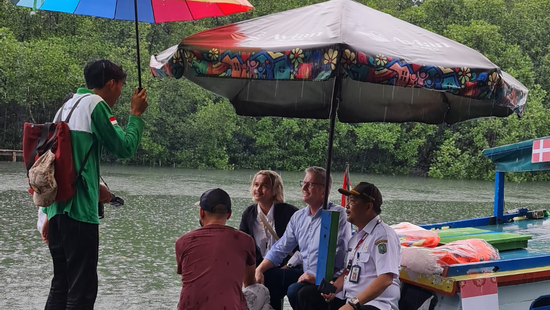Solution provider

Through its global network of missions and experts, the Ministry of Foreign Affairs of Denmark facilitates intelligent cleantech solutions worldwide.
Case
Green financing
Climate change adaptation
Water resource management


Through its global network of missions and experts, the Ministry of Foreign Affairs of Denmark facilitates intelligent cleantech solutions worldwide.
Add the case to your visit request and let us know that you are interested in visiting Denmark
Indonesia’s mangroves account for over 20% of total global mangrove area with the richest mangrove biodiversity in the world and acts as an efficient carbon sink. Despite this, Indonesian mangroves are threatened by deforestation and degradation by approximately 13,000 ha per year. It is estimated that there are still about 7.2 billion tons of CO2 stored in mangroves in Indonesia.
Unfortunately, a large part of Indonesia’s economy continues to be driven by unsustainable exploitation of natural resources, which undermines the country’s stock of natural capital. Coastal communities are among the most vulnerable in Indonesia and face poverty rates above the national average, multiple threats to their livelihoods as well as challenges regarding access to secondary school, safe water, electricity and transportation.
Indonesia harbors the largest area and diversity of mangrove ecosystems in the world. Mangroves support coastal livelihoods through fisheries (fish, crab, and other seafood), protect the country’s coasts from disasters, and store 3.14 billion tons of CO2, playing a significant role in mitigating global climate change
Read moreDenmark supports the Indonesia Mangroves for Coastal Resilience Project (M4CR), which is implemented by the Government of Indonesia with the support of IBRD/World Bank.
The Danish support will assist Indonesia’s access to blue carbon finance for conservation and rehabilitation of degraded mangroves, including integrating carbon into monitoring systems and supporting policies, governance, and regulations.
The overall results for M4CR are approximately 40 million tCO2e over 30 years and approximately 3 million tCO2e saved during the five-year project timeline from rehabilitation and avoided deforestation activities.
The result of the Danish support to project will strengthen policy framework and institutional capacity for development of a blue carbon financing mechanism that will ensure the long-term sustainability of the mangrove rehabilitation and conservation.